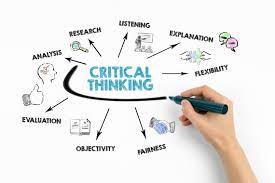Critical thinking is the mental process of actively and skillfully analyzing, evaluating, synthesizing, and applying information and ideas to form well-reasoned judgments and decisions. It entails systematically and objectively examining complex issues, problems, or situations to understand them deeply, identify potential solutions, and make informed conclusions.
Key components of critical thinking include:

- Analysis: Analyzing information by breaking it into components, evaluating their relationships, and detecting patterns or underlying assumptions.
- Evaluation: Evaluate the credibility, relevance, and quality of information and arguments to identify their strengths and weaknesses.
- Inference: Using available evidence, reasoning, and prior knowledge to draw logical conclusions.
- Interpretation: It is essential to comprehend the meaning and importance of information, data, or evidence within a larger context.
- Synthesis: Merging information, ideas, or concepts to create innovative solutions or perspectives.
- Problem-Solving: I utilize critical thinking skills to recognize and tackle obstacles and discover practical and successful resolutions.
- Reflection: Engaging in self-assessment and considering personal biases, assumptions, and perspectives to enhance objectivity and learning.
Thinking critically is extremely important in many aspects of life, such as academia, careers, decision-making, troubleshooting, and communication. It enables individuals to become more efficient and self-sufficient learners, make better decisions, and quickly solve problems. By promoting critical thinking, people can confidently navigate complex situations, make informed decisions, and engage in informed discussions and debates.
